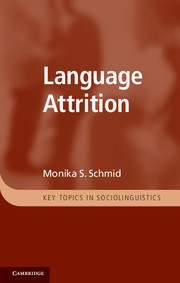Book contents
- Frontmatter
- Contents
- List of figures
- List of tables
- Preface
- Abbreviations
- 1 Introduction
- Part I Linguistic aspects of language attrition
- 2 What is attrition?
- 3 Cross-linguistic influence and the mental lexicon
- 4 Attrition in the mental lexicon
- 5 Attrition and the structure of language
- Part II Extralinguistic aspects of language attrition
- Part III Conducting research on language attrition – preliminary considerations
- Part IV Experimental designs for attrition research – the language attrition test battery
- Part V Coding and analysing the data
- 18 Conclusion
- Glossary
- Notes
- References
- Index
2 - What is attrition?
Published online by Cambridge University Press: 05 June 2012
- Frontmatter
- Contents
- List of figures
- List of tables
- Preface
- Abbreviations
- 1 Introduction
- Part I Linguistic aspects of language attrition
- 2 What is attrition?
- 3 Cross-linguistic influence and the mental lexicon
- 4 Attrition in the mental lexicon
- 5 Attrition and the structure of language
- Part II Extralinguistic aspects of language attrition
- Part III Conducting research on language attrition – preliminary considerations
- Part IV Experimental designs for attrition research – the language attrition test battery
- Part V Coding and analysing the data
- 18 Conclusion
- Glossary
- Notes
- References
- Index
Summary
What is attrition? What is it that attriters do in their first language which is different from what monolingual speakers do? What kinds of code-switching and code-mixing phenomena do they use? What kinds of ‘errors’ do they make? And – perhaps even more importantly – what kinds of errors do they not make?
This chapter will acquaint you with the phenomena you can expect to find when you listen to attriters using their first language spontaneously and naturally.
In chapter 1 I introduced two native speakers of German who had both grown up using their first language exclusively in their daily lives until age 13, when they moved to an English-speaking environment. Nearly six decades later, one of them – Albert L. – retained a fairly fluent command of German, while the other – Gertrud U. – had great difficulties expressing herself in that language.
This discrepancy raises the question of what attrition is and where it begins. Is there a clear and perceptible boundary in linguistic skills which marks the distinction between an attriter and a non-attriter? Can we define it in terms of time – can we, for example, say that it sets in after ten years? Obviously not, or not exclusively: Gertrud U. and Albert L. had both been living in an English-speaking environment for approximately the same length of time.
- Type
- Chapter
- Information
- Language Attrition , pp. 11 - 17Publisher: Cambridge University PressPrint publication year: 2011



